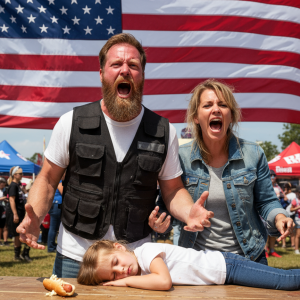Story
I’m Elise, and the day my four‑year‑old, Nora, lay crumpled at the foot of my parents’ staircase was the day every comforting notion I had about “family” shattered into dust.
Some people later called my response ruthless—unforgivable, even—but once you’ve walked through the next few pages with me, I doubt you’ll see any other path I could have taken.
It all started at what should have been a sweet celebration: Dad’s 65th birthday. Balloons, a sheet cake, and three generations squeezed into the old house where my sister and I grew up.
Nora, in her unicorn dress and glittery sneakers, twirled the moment we arrived—oblivious to the chill that always rolls in with my older sister, Kendra, and her daughter, Madison.
Kendra has been the family sunbeam since childhood; our parents orbit her. At 13, Madison enjoys the same immunity. She’s the kind of tween who speaks in eye‑rolls and gets away with it.
Meanwhile, Nora is the invisible grandchild: polite, soft‑voiced, overlooked. Gifts pile in Madison’s lap; Nora gets a pat on the head—if anyone remembers.
I kept telling myself they’d come around. I clung to hope the way kids clutch playground bars—until that afternoon.
The second we stepped inside, Madison wrinkled her nose. “Ugh, why’d you bring her?” she stage‑whispered.
“Madison, be kind,” I said, trying to keep my voice light.
From the kitchen, Kendra laughed. “Relax, Elise. Teenagers just don’t like toddlers. Totally normal.” That word—normal—would buzz in my ears for weeks.
Nora found a quiet corner, hugging her plush elephant. I caught Madison watching her like a bored cat studying a nervous mouse. My stomach twisted.
Mid‑afternoon, a wail split the chatter. “Stop it, Madison! That’s mine!” I hurried in: Madison had snatched the elephant.
“Only babies play with junk,” Madison sneered.
“Give it back,” Nora pleaded. I stepped between them, voice firm. “That’s enough.”
Kendra didn’t even glance up. “Let them figure it out—it’s good for them.”
A slap cracked through the room. Nora’s cheek glowed red; Madison smirked. “She hit me first!” she lied.
“She’s four,” I hissed. “You’re thirteen.” My parents shrugged—“Kids toughen up by rough‑housing.” Madison basked in their approval.
Furious, I walked Nora upstairs to wash her face. She clung to me, whispering, “Mama, why is she mean?” I had no good answer.
We stepped back into the hallway—and there was Madison, all sugar‑sweet grin. “Surprise for you downstairs,” she cooed. I squeezed Nora’s hand. “We’ll go together.”
At the crest of the spiral staircase, Madison blocked us. “You’re so annoying,” she muttered—then shoved.
Time slowed. Nora pin‑wheeled, crashing down fifteen polished steps before her skull struck the landing with a crack I will hear in nightmares forever.
I screamed. She lay twisted, blood trickling near her temple, eyes fluttering. My hands shook dialing 911.
My family gathered at the top, not the bottom. Kendra actually laughed—laughed. Mom murmured, “She’s fine.” Dad added, “Kids bounce.” Madison’s face was blank stone.
Paramedics arrived in minutes. At the hospital we learned Nora had a skull fracture, concussion, and brain swelling. “An hour later and she mightn’t have made it,” the doctor warned.
No calls. No visits. My parents, my sister—nothing. Beside my sleeping daughter, I broke in half, then reforged myself into steel.
I vowed no one would ever dismiss her pain again. The next morning, I started.
First stop: Madison’s elite school. I handed the principal police files and medical images; CPS was already involved. Madison was suspended, then expelled.
Kendra’s real‑estate license? Gone after I forwarded evidence of neglect to the state board. Her brokerage dropped her like a hot coal.
My parents’ beloved family restaurant had been skimming cash for years—records I’d quietly saved. The IRS agreed. Within months, fines emptied their nest egg and the doors shuttered.
Remember Kendra’s brag about an affair with a married coworker? Screenshots, photos, emails—I sent the bundle to his wife and HR. Two marriages imploded; two careers ended.
Still, they claimed Nora “just fell,” so I recorded every call, every shrug. In court, I laid out the whole grim mosaic: medical reports, audio files, eyewitness notes.
We settled for nearly $400,000—money that now grows quietly in Nora’s college fund. But the real victory was the verdict stamped across their reputations: negligent, abusive, guilty.
Today, Nora is seven—healthy, wary, but braver than before. Sometimes she asks why her cousin pushed her. I tell her gently: some people break things they fear shining brighter than themselves.
Kendra? Bankrupt and alone. My parents work part‑time just to cover rent. Madison, now an adult, carries a stain Google will never let her scrub away.
I carry no guilt. Because when your baby lies broken at the bottom of the stairs while your own blood laughs, forgiveness isn’t virtue—it’s surrender. And I will never surrender her again.





